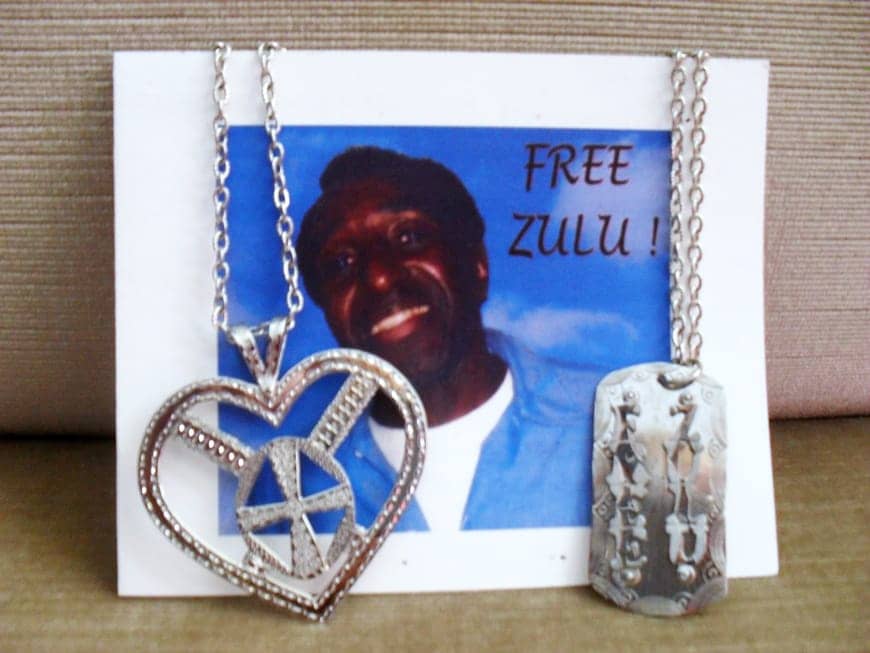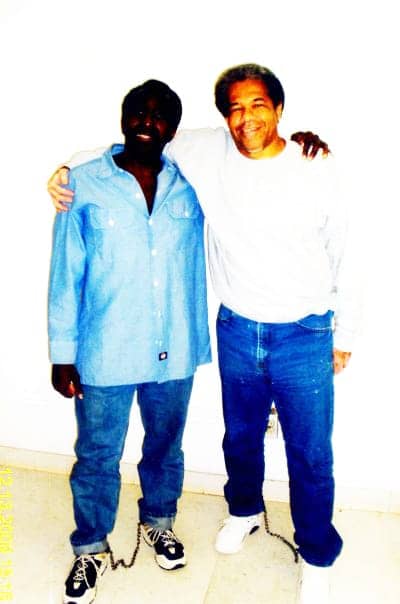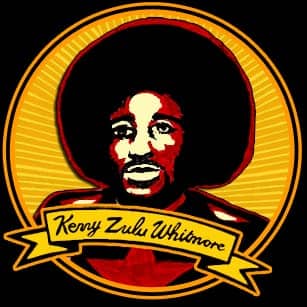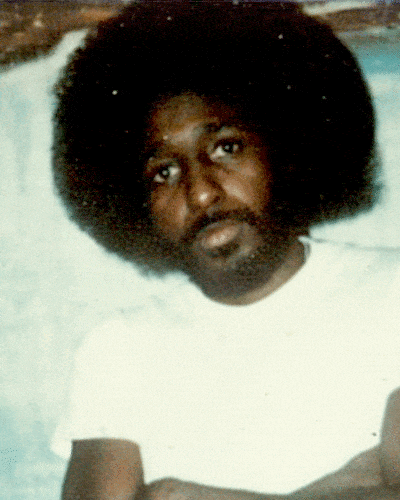Greetings, my people:

On Aug. 15, 1973, the ex-mayor of Zachary, Louisiana, was found murdered on his Rollins Road farm in Zachary, a small rural community that sits in the northern section of East Baton Rouge, EBR. This was a huge episode in our then small community. He was rich, white and was still running Zachary.
Immediately, the next day the li’l town was in a buzz, because a rumor had spread like a California brush fire fueled on by Santa Ana winds that the terrorist of the day had murdered the mayor.
I was 18 years old then and still feeling the sting of racism in its worst form for several reasons:
The first being that I was a witness against a Zachary policeman, Ted Donnaway, who had murdered my first cousin, George Payne Jr., on Nov. 19, 1969. Hearings began in 1971-’72. The terrorists were calling my parents, telling my mother I was dead, or they would kill me, bomb our home etc. Needless to say the cops were never put on trial for the murder of my cousin.
The second reason being that school integration had finally hit all of EBR Parish, including Zachary. Our 1971-’72 school year, we Africans had to integrate Zachary High and leave our beloved North West High behind. And what a trip: racial fights every day. Shit spilled over into an already racist community.
I became one of the student leaders. We protested against the dress code only for us, no power fist rule, etc. It was up to us to change the way we African students were being mistreated, and we did just that.
On Feb. 19, 1975, I was arrested on trumped up charges of two counts of armed robbery and rape of a female employee of a Zachary shoe store. Five days later, while being held over in the EBR Parish prison for arraignment and an evidentiary hearing on Feb. 24, 1975, between the hours of 12:30 a.m. and one o’clock a.m. – and mind you, this was my first time ever being in anything that serious – it happened.
First time in jail, one must fight or become something less than man. So while being in the dungeon on Feb. 24, 1975, I was awakened by the steel door being opened. It was already eight of us packed into this hole built for three at the most. And naked. Yes, they used to make you strip before going in there to promote homosexuality and to further humiliate you.
The door opened, air rushed in – momentary relief. The captain and a fat guy in a suit. In low voices guys were saying that’s Ossie Brown, the district attorney. I had heard of him, but didn’t know him from the first Adam.
“Whitmore. Whitmore.”
“Yeah.”
“Come out. Put on your clothing.”
“For what?”
“Whitmore, come forward now.”
I stepped out. Got my clothing. Black and white striped uniform and shorts.
I was led into the interrogation room. Just this guy and myself.
“My name is Ossie Brown. I am the district attorney of EBRP. You might have seen me on TV before.”
“No.”
“Well, there are a few things that I want to discuss with you.”
Mind you, I had a lawyer at this time. I was represented by the Public Defenders’ Office.
D.A.: “I know you are charged with the robbery and rape that happened at Bill’s Shoe Store out in Zachary. And the victims say you are not the perpetrator. These charges will be dropped.”
I was starting to feel better. I was going home.
D.A.: “You knew who Marshall Bond was?”
“Who?”
“Marshall Bond, who was murdered at his farm out there in Zachary?”

The D.A. had a confession already drawn up. He wanted me to turn state’s evidence on a guy he wanted to put this murder on. I didn’t know what state’s evidence was. He says: “I want you to take the stand against this guy and say what’s in this confession.”
I went crazy for real then. “I need my lawyer, guard. I want my lawyer, guard. Man, I don’t know what you are talking about.”
“Whitmore, I am the district attorney. I am the only one who can help you. My word is three times that of yours. If I say you said something or did something, who are they going to believe: me or you?”
I said the truth. He said his truth.
“I will send you to Angola for the rest of your life. Do you know what they do in Angola, Whitmore? Sign this, and I will help you.”
“I don’t know what you are talking about.”
The D.A. started to tell me things about me and my family that had me spooked. Where my mom and dad, brother and sister worked. The things I was involved in during integration. A fight that a friend and I had with a group of white boys in 1972. It wasn’t until much later that I realized that my family and I had been under observation. Yes, plain old COINTELPRO.
After his lengthy persuading, saying, “I am the only one who can help you; I will send you to Angola for the rest of your life if you do not do what I say,” D.A. Ossie Brown said: “I am going to step out for a while. I am going to send someone in to speak with you.”
This whole ordeal started between the hours of 12:30 a.m. and 1 a.m.
Three guys walked in in plain clothing: “We are with Mr. Brown’s office. And we understand that you are ready to cooperate with us. First we need you to sign this” – speaking of the confession.
“I am ready to go back to the hole. I need my lawyer.”
After the hollering, punch here, there. Chokeholds. Grabbing. I was finally taken out of the interrogation room and put into a holding tank – a big cell. This was at 4:00 in the morning, because right after that guys from all over the jail started to fill the tank. I asked someone: “Where is everybody going?” He said: “To court.” Court, huh.
A few minutes later breakfast came. The steel trays. Milk and coffee, pancakes, syrup and some pork. I drank the coffee and gave the rest away. Later when the trays were picked up, the guys were talking to their homies on different topics.
About 8 o’clock, guards with lots of handcuffs appeared. “All right, listen up. As I call your name, step out – two to a cuff.”
This is the reason why I have been saying that I was kidnapped out of East Baton Rouge Parish Prison, EBRPP.
Two plain clothes detectives appeared at the gate: “Whitmore, come forward. Hands behind your back.”
“Where am I going?” “Court. Turn around, hands behind your back.”
I was cuffed, taken down the hall, stepped out where everyone is being stacked into the patty wagon that looked like an armored car. This way, we went around the patty wagon to a car with no marking on it. I began to feel strange. They left the prison. The car went down Harden Boulevard – at the light, taking a right, not a left, that would take you to downtown Baton Rouge.
“Where are you taking me?” About 15 times. Then one of them said: “You should have done the right thing.”
I was taken to the police station in Zachary and put in a room – minutes later, to another building across the street from the bank and the Bonds’ family home. Then, a detective came in.
“Whitmore, Mr. Brown wants you to know are you ready to cooperate?”
“I want to talk with my lawyer. Let me call home. I need my lawyer.”
“You had your chance.”

The two detectives spoke with Ossie Brown. He came to the car. “Whitmore, are you ready to cooperate?”
“Get my lawyer. I want to see my lawyer.”
I would be lying if I said I wasn’t afraid. Fact is, I was scared to death. Who knew where I was?
D.A. Ossie Brown said, “Get him out of the car.”
I was roughly pulled from the car. The D.A.: “Are you going to cooperate?”
“I need my lawyer.”
Ossie Brown turned away. Still cuffed, I was grabbed by the neck by one of the detectives from behind in a chokehold. The other one started beating me on my body.
The D.A. Ossie Brown: “Whitmore, are you ready to cooperate?”
“Why are you doing this? I need my lawyer. Take the cuffs off.”
The Bonds’ car came into sight. “Do you see that car?” the D.A. said. “You know who that is, don’t you? I can help you.” The D.A. said: “Stop the car.”
The cop behind me hit me directly in my spinal cord. I fell backward, and he applied a chokehold on me.
“Let him up,” D.A. Ossie Brown says. “You died trying to escape. Send the car on.”
“OK, OK. I will help. I need you to sign this.”
“I don’t know what it says.” A hit to the stomach. “I will tell you what it says.” “Man, I don’t know nothing about this.” D.A.: “Are you going to cooperate?”
I was cuffed, put back into the car and taken to a backroom in Zachary City Hall. Three guys come in. I was beaten some more, asked a million questions. That evening I was taken to a building in downtown Baton Rouge. This had been going on forever. I had not slept since leaving the dungeon at East Baton Rouge Parish Prison.
While in this room, still handcuffed, a cop put the phone to my ear. It was Ossie Brown’s voice, saying: “Whitmore. I am the only one who can help you. Sign that document.”
They kept questioning me. Hollering at me. Slapping me on the sides of my head and in my face.
This is how the so-called confession came about. The tape was spliced to get it to say what they wanted. This is why the audio was so poor. And they, my lawyer, the assistant D.A. and judge had to go into the judge’s chambers to make out what was being said. The judge told the jury, “It’s his voice,” but nothing was said that could help him.
About 7:15 p.m., I was taken to another building, called the Taylor Building, where they wanted me to take a lie-detector test. This was torture in every sense of the word. Deprived of sleep, food; hollering, shaking, beating, isolation – all of those tactics are considered torture.
Another phone call. D.A. Ossie Brown: “Whitmore, cooperate. I am the only one who can help you.”
“I need my lawyer.” I was being represented by Alton Moran of the Public Defenders’ Office.
I agreed to take the lie-detector test. I was asked what color blocks were, my name, my mom’s name. I jumped up, pulled the wires off of my hand, and went to grab the machine. Three of them bum-rushed me through the door and pinned me to the floor, cuffed me. “Man, fuck y’all.”
It was 8 p.m. when three cops took me over to the downtown jail on the top floor. The three signed a log book and time-in. They talked in low voices.
One of the cops at the desk said, “Come with me.” I was put in isolation right behind the desk. I was put in the hole, handcuffs removed. I was brought two sandwiches. I ate them and tried to go to sleep. But all night I was being woken up. “Whitmore, Whitmore, wake up.” “What?” He laughed and walked off. This went on all night.
Early the next morning I was taken to another building. The torture started up again. Until I broke down and said most of what they told me. And I signed that confession. They got what they wanted.
I was taken back to the downtown jail, put back into isolation, where I must have slept two and a half days.
The third or fourth day, the lawyer showed up. I told him everything. He got me moved to a regular cell. And asked me how the hell did this happen? He left, headed for the D.A.’s office, he said.
I stayed in that roach-infested old downtown jail for five months before being transferred back to the EBRPP.

Although the charges had been dismissed, I still could not go home with my mother, father, sister Jeanette, because of the Aug. 15, 1973, murder of the mayor.
Nearly one year later, on July 14, 1976, the evil empire struck. D.A. Ossie Brown made good on his word. That he could send me to Angola even if I were innocent. He filed a joint bill of information, accusing me and Perry Lee Payne of two counts of armed robbery of the very store both victims 11 months earlier said I did not commit. However, both victims picked my co-defendant out as the perpetrator.
On Sept. 27, our trial began on what was supposed to be two counts of robbery, but the whole trial and evidence was of rape. In three days of rape trial, my name never came up. My state lawyer objected and asked for a verdict (post-verdict judgment) of acquittal, because the trial was of Payne’s rape of the female victim. Denied.
Both victims again took the stand and cleared me of any crime. On Sept. 29, the jury deliberated, returned to the courtroom 20 minutes later to ask Judge John S. Covington how could I be charged or found guilty of anything, when I have not committed a crime? The judge went on this long outdrawn shit, confusing the jury.
I jumped up: “Your honor, you are confusing them.”
“Sit down! Order in my court, Mr. Whitmore. Sit down.”
My lawyer: “Kenny, Kenny, let me handle it.”
He made the objection. Overruled.
The jury went back to deliberate. But returned to the court about 15 minutes later. The judge asked, “What is it this time?” The foreman: “We do not understand. How can Whitmore be charged with anything?” The judge starts to read from a book. I raise my hand and tell my lawyer to object. He does. I ask the judge could he just tell the jury in plain language? No. The D.A. follows the jury to the jury-room door, hollering, “You better not find him not guilty, you hear me?”
The jury returned three minutes later for the third time and did as the judge instructed: You must find them both guilty. “We have a verdict, your honor.”
As to Perry Lee Payne: guilty on both counts. As to Kenny Whitmore: guilty on both counts.
Shortly thereafter, the court ordered a pre-sentence investigation report. On March 14, 1977, probation and parole agent James P. Patin submitted his report to the sentencing judge.
A pre-sentence investigation report is a background report into your life. From pre-school to the present. And the judge will base your sentencing range on that report and the seriousness of the crime.
This is my first conviction. I have never been in a “boys’ home,” “juvenile hall” or any of those places.
On April 15, 1977, Judge John S. Covington sentenced me on count 1 to 75 years without benefit of probation, parole or suspension of sentence. Count 2 he sentenced me to 50 years of hard labor, with the sentences to run consecutively. I was led off upstairs when my dad and sister asked the judge for 10 minutes to talk with me. A 125 year sentence for absolutely nothing.
It took me until 1985 when the 5th Circuit Court of Appeals granted me a hearing, and this is when I found out that the sentencing judge used the pre-sentence investigation report to sentence me by. The report was padded with false charges: It had me being charged with eight counts of armed robbery, two murders. It also gave me a juvenile record from age 12-16, saying I spent time in Juvenile Hall for theft, felony theft, a count of aggravated burglary for which I was placed in Juvenile Hall. My records were padded with all of that erroneous information. To make sure that my appeals would be denied. They have been.
I will not get a favorable decision. I did not, when I went before the state’s Pardon Board in 2000. My alleged criminal history was the only thing they wanted to talk about – and they did not want to hear that it was fabricated.
The Clerk of Court continues to tell me that the pre-sentence report and the witness and victim’s testimonies are under seal and that I cannot get them. These are issues that I continue to fight in court to this day.
On the 1973 robbery and murder of the mayor of Zachary, La., I went on trial on Jan. 3-6, 1977, for second-degree murder and armed robbery. The only evidence against me was a spliced partially audible so-called confession, and a rusty bucket. I have yet to find out what the bucket had to do with anything. It’s the bucket that the judge told the jury about, that on the inaudible part of the confession I said I took this bucket from the mayor’s farm after he was killed. And took it to a park. A recreational center. And that bucket was found in the exact same spot as I was alleged to have said. That was it. No other evidence.

On March 14, 1977, I was sentenced to life on count 1 without the benefit of probation or parole or suspension of sentence for 20 years, meaning after 20 years I become eligible for parole; or the judge can suspend my sentence right now and resentence me to 20 years.
On count 2, armed robbery, I was sentenced to 99 years of hard labor. This sentence for the robbery is an illegal sentence, because it was used as the underlying felony to convict me of the murder.
I know from research that I can win a reversal of both of my sentences, but I will need counsel to do so. I have tried filing pro se, but anyone with any legal knowledge of the Louisiana judicial system knows that a pro se application is stamped “denied” no matter how grantable the application is. It’s like incarcerated individuals are punished for becoming knowledgeable of a system that binds us. I dare you with an 11th grade education to sit there in prison and point out constitutional violations that our system has denied. I am in grave need of assistance of counsel.
I arrived here at Louisiana State Plantation at Angola, La., in March 1978. Within an hour I was thrown into CCR: solitary confinement. I was placed on D-Tier, the so-called militant tier. I met and befriended some of the most righteous brothers in my life during those hellish years in this battlefield.
I became a member of the Angola Chapter of the Black Panther Party and in keeping with the spirit and ideology of the Panther Party, we did what we had to in order to perfect change. And in doing so, I went through a political education that I was not – and that I am still not – afraid to use in my everyday life here behind enemy lines. But as with juridical education, when one educates oneself politically on the plantation, one is punished because of one’s views of what daily hell is, or what rotten half-prepared food is, or what constitutes torture.
I say this is torture: Being held in this solitary confinement cage where I can stand in the middle of the floor, extend my arms, and touch both walls. For the last 34 years, 23 hours a day is by definition torture.
They say it is because of my political education, affiliation with the Angola 3 – Shaka, King and Chairman Hooks – and my ties to the Black Panther Party.
I say it is because of their white supremacy affiliation, and ties to the 1950s-1990s terrorist groups here in The Boot.
“In the fell clutch of circumstance / I have not winced, nor cried aloud, / Under the bludgeonings of chance / My head is bloody, but unbowed.” – from “Invictus” by William Ernest Henley
Forever, Zulu
Send our brother some love and light: Kenny Zulu Whitmore, 86468 – D/HAWK – 4L, Louisiana State Prison, Angola, LA 70712. A letter was written on Nov. 16 to U.N. Special Rapporteur on Torture Dr. Juan Mendez calling for an investigation of the torture Zulu endured in 1975. He has been behind enemy lines over 35 years.
http://youtu.be/sOFmPUQJE1g





